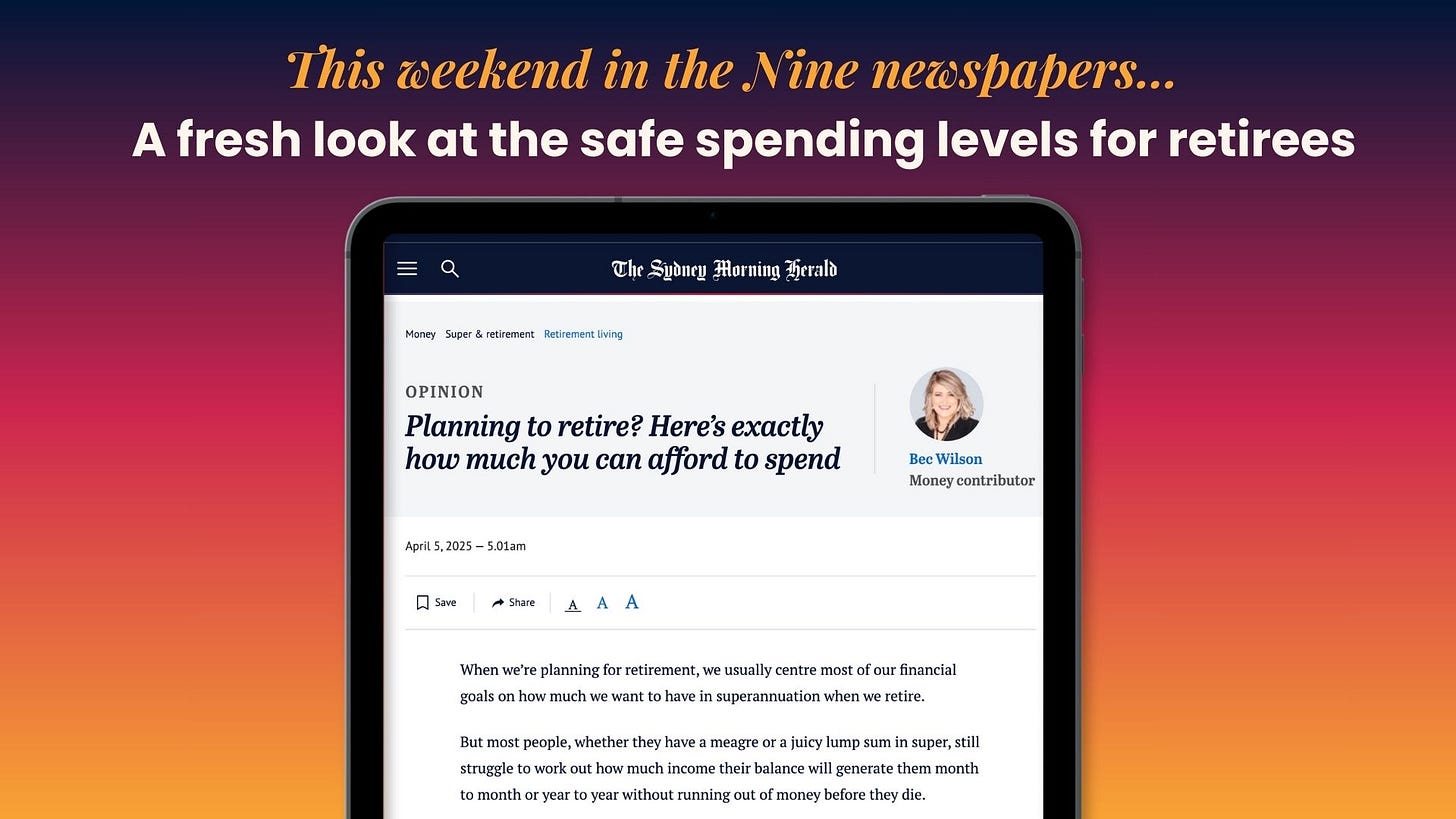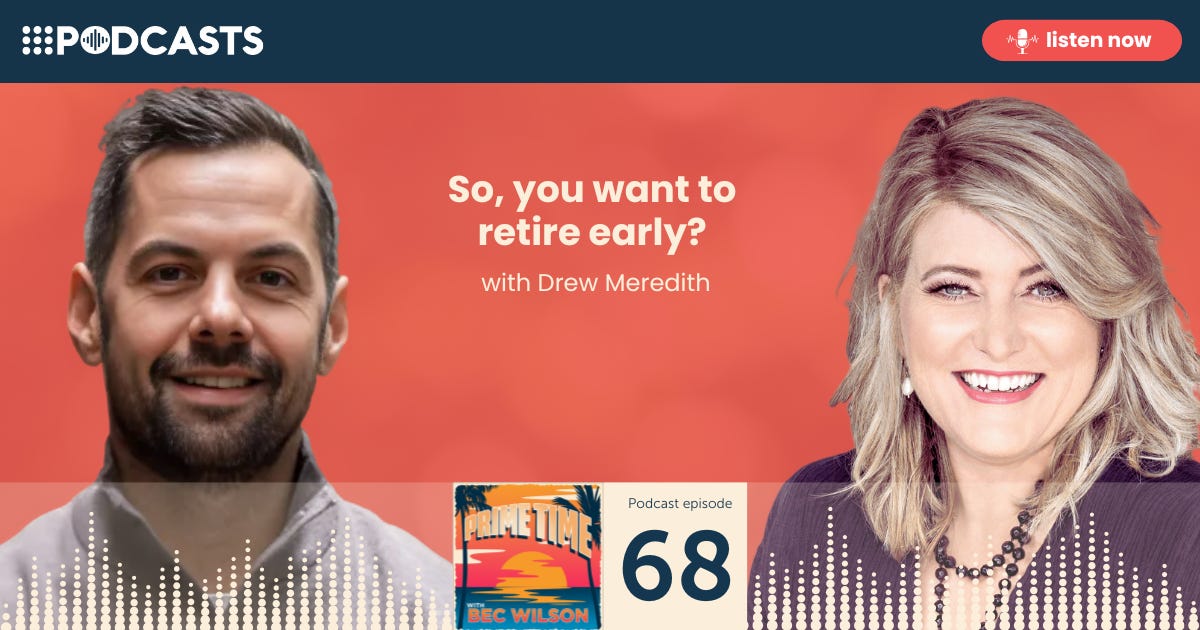Retirement panic? Here’s how to stay steady when the news gets noisy
And in today's newspapers, 'Planning to retire? Here’s exactly how much you can afford to spend'
In this week’s edition:
Newspapers: Planning to retire? Here’s exactly how much you can afford to spend
Feature: Retirement panic? Here’s how to stay steady when the news gets noisy
Podcast: Do you want to retire early?
From Bec’s Desk: A wild wild week!
Now, an important promotion for Winter course!
We’re getting ready to kick off – are you in?
The How to Have an Epic Retirement Flagship Course kicks off on the 10th April, and we’re sending out the welcome packs this week to everyone who's coming along. It’s six weeks of practical, engaging, real-life retirement planning—designed to help you feel more confident, more in control, and ready to shape your next chapter.
Here’s what’s included:
Six weeks of well-structured online learning, delivered across 14 modules
Six live Q&A events with some of Australia’s top retirement experts (mostly Monday nights, with a break for Easter)
A professionally published, 150-page workbook—exclusive to participants
A signed copy of How to Have an Epic Retirement
And a few surprises along the way
This course gets rave reviews. In fact, 100% of participants in the most recent intake said they’d recommend it to a friend—and they told us their retirement confidence had significantly improved thanks to the program.
📥 Download the brochure here
📅 Book your place here
I’ve got a coupon code that will give Epic Retirement Newsletter subscribers 15% off the RRP if you missed the earlybird deal: LASTCALLW25
Here’s a fresh new testimonial from our Autumn program that only wrapped up last week! 😎
“I found this course to be a breath of fresh air in the retirement space. Bec and her team provide you with a holistic experience that doesn't just cover th financial aspects of retirement. It delves into budgeting (and provides some fantastic resources in this area), retirement planning, mental wellbeing, health and ageing and travel. In the process she enlists the help of experts in these various fields. the workbook she provides is very professional and extremely helpful. After completing the course I have a much better idea of what my epic retirement will look like AND what I need to do to make sure it happens. Thank you so much Bec and all the other experts we spoke to in our course. You guys are making a real difference for pre-retirees and retirees.”
Retirement panic? Here’s how to stay steady when the news gets noisy
People approaching retirement in Australia are feeling a little bruised and nervous this week – or most of them awake at the wheel are anyway. Liberation Day in the USA where Trump implemented the biggest changes to tariffs in a long time has left markets in freefall and the (somewhat unnecessary) media storm around a co-ordinated cyberattack on our superfunds and subsequent rush to login to super websites to check balances and bank details has seen them falling over for members for nearly two days.
So today I’m going to focus on the calm steps you can take if you’re feeling rattled, to reclaim a bit of control, protect what you’ve built, and remind yourself that short-term chaos doesn’t have to derail your medium and long-term retirement plans.
Here’s what to focus on:
1. Don’t make panic moves
This is the golden rule. When markets tumble, it’s tempting to jump online and switch your super to cash — but that often just locks in losses and leaves you on the sidelines when the rebound comes (and it usually comes quicker than expected).
Instead, pause. Your fight-or-flight response is real — but so is the mountain of evidence showing long-term investors come out ahead. Let the adrenaline fade. Give your amygdala a moment to stand down, and let your prefrontal cortex take the wheel — that’s the part of your brain that handles logic, planning and clear-headed decisions – but it takes longer to kick in when there’s panic.
2. Check your mix, not your balance
It’s natural to be afraid to peek at your super balance after a rough market week — but you must remember, the number alone doesn’t tell the full story. What matters more is how your money is allocated. If you’re within a few years of retirement, it might be time to start thinking in buckets.
A bucket strategy breaks your super into two or three parts and allocates them to a suitable risk level for the horizon they will be needed. Here’s an example. But get some advice as this differs depending on your situation.
Short-term bucket for the next 2–3 years of income (usually in cash or lower-risk assets)
Medium-term bucket for the next 3–7 years (in stable, income-generating investments)
Long-term bucket for money you won’t need for a decade or more (still in growth assets like shares)
If you’ve already got a mix like this, great — you can ride out the storm with more confidence. If you don’t, your next step might be as simple as making sure you’ve got the next 1–2 years’ worth of spending tucked away in cash. That breathing space gives your long-term investments time to recover, without you needing to sell at the worst possible moment.
3. Remember: the super system is robust — but your passwords matter too
This week’s headlines made it sound like hackers were swarming the gates of every super fund and balances were vanishing into thin air. The reality? According to the funds, only four people lost money — and even then, it was through targeted breaches, not mass theft.
Super funds have strong, multi-layered cyber protections. The so-called “co-ordinated attack” turned out to be more disruption than destruction — with websites crashing under the weight of concerned members all rushing to check their balances and personal info. Frustrating, yes. But not a sign your money was missing.
If you’re worried, the best action you can take isn’t to panic-refresh your balance — it’s to update your login / password details. Strong, unique passwords (not the same one you use for everything!) and two-factor authentication are your best defences – they really are. Super funds are holding up their end of the bargain — we just need to do the same on ours.
4. Stay focused on your plan
If you’ve got a plan — whether it’s retiring at 65, downsizing at 70, or drawing down slowly over 30 years — a few rough weeks on the market doesn’t undo it. Your strategy was never meant to hinge on a single news cycle. That’s the whole point of having a plan: it gives you something solid to stand on when everything else feels a bit shaky.
If you don’t yet have a clear plan? This is your sign to make one. Knowing where your income will come from, how you’ll use your super, and how much you actually need to live well in retirement makes a huge difference — especially when the headlines are screaming.
And a plan doesn’t have to be complicated. It can start with three simple questions:
What will I live on in the first 5–10 years of retirement?
How will I draw from my super over time?
Do I have a buffer to ride out the bumps?
When you can answer those — even roughly — you’re already in a better place than most. The goal isn’t to time the market perfectly. It’s to move forward with confidence, knowing your plan can handle a few speed bumps along the way.
5. Talk to someone (real, not just to people on social media where the drama is high)
Your cousin on Facebook might be shouting about moving everything to gold or crypto — please don’t follow the herd (or even listen to them). If you’re feeling unsure, it’s a great time to book a chat with your super fund’s advice team (make an appointment when their website is back online ideally) or to speak to a licensed financial adviser. Many funds offer free advice on your investment options. Others offer a first appointment free on your retirement planning. Ask them what’s available to get you started.
It was a wild wild week (in markets, funds and real life). Mine started in Byron Bay, presenting to the Sales Team Conference for Ingenia Lifestyle Communities about how they can make retirements epic. Then, back to Brissy to prepare for our Epic Retirement Winter course launch this week. All the workbooks have been mailed — and we’re ready to launch the course content on Thursday at noon.
I’ve recorded a few fun podcasts this week — the first of which came out on Thursday with Drew Meredith, from Wattle Partners. A really pragmatic chat about the things you need to know if you’re thinking about retiring early. Have a listen (details below).
I’ve done a huge article for The Age and The Sydney Morning Herald — on safe spending levels, with help from the Challenger team who are known for their great data on this.
And finally — I bumped out a last minute newsletter on Friday afternoon all about the Cyberattack on Australian Super Funds because so many people were worriedly posting pictures of their superfunds’ websites ‘down’ on Friday. I investigated — chatting with the affected funds and they were keen to make sure the message got out about how website traffic was the problem not ongoing attacks.
In the week ahead we’re going to be unveiling the book cover for Prime Time, my next book, so watch this space… it drops on Wednesday I believe. I am a little excited to hear your thoughts!
Got some thoughts about the topics this week — leave a comment or write me an email. I love to hear from you!
You can always email me at bec@epicretirement.com.au.
BTW — my puppy is improving — slowly slowly. Still running a dog-care centre as I write!
Many thanks! Bec Wilson
Author, podcast host, columnist, retirement educator, and guest speaker
Planning to retire? Here’s exactly how much you can afford to spend
Extract of article published in print in The Age, The Sydney Morning Herald, Brisbane Times, WA Today on Sunday 6th April 2025.
When we’re planning for retirement, we usually centre most of our financial goals on how much we want to have in superannuation when we retire.
But most people, whether they have a meagre or a juicy lump sum in super, still struggle to work out how much income their balance will generate them month to month or year to year without running out of money before they die.
You’re not alone if you look at your super balance and think, “I wonder what that amount actually means for me year to year?”
Well, today I’m going to answer that, and the short answer is … it depends. It depends on how long you live. It depends on how your investments perform. It depends on whether you’ll be eligible for the age pension and, if so, how much. And it depends on how your spending patterns change over your lifetime – as you move from your epic retirement years into ageing and frailty.
None of us know the answers to these questions with certainty, but we can lay out a reasonable plan and project a sustainable amount that would be appropriate to spend year to year using solid assumptions, realistic simulations and a bit of planning discipline.
The financial services industry quite commonly uses what’s called a safe spending rate – basically, the amount you can withdraw from your super each year, with a high probability that your money will last as long as you do.
A couple with a starting balance of $600,000 in account-based pensions could spend $65,300 per year.
This isn’t about squeezing every last dollar out. It’s about setting a pace of spending that supports a great lifestyle and reduces the chance of running short in your later years.
A good safe spending calculation should take in a conservative view of your life expectancy in case you live a long time. It will build in inflation adjustments to your spending, so your income keeps pace with rising prices, and it will have an expectation that the performance of markets will vary over the years. (READ ON… here in The Age, The Sydney Morning Herald. )
Do you want to retire early?
Thinking about pulling the pin early on work? This episode of Prime Time dives deep into what it really takes to retire before 60 — and why it’s not just about scrimping and living on two-minute noodles. Bec is joined by wealth expert Drew Meredith from Wattle Partners to unpack what financial independence truly means, who early retirement suits, and how to actually fund those golden years (and silver ones, and legacy ones too).
Whether you're aiming to leave your job in your 50s or just want more lifestyle freedom, this episode is packed with practical guidance, honest perspectives, and a few laughs about budgets, buckets, and breaking free from the grind.
LISTEN TO THIS EPISODE OF THE PODCAST HERE:
Last of all, if you haven’t read the book, you can order your copy from Amazon online. Or pick up a copy at your local Big W, Dymocks, or QBD stores. And if your bookstore doesn’t have it - ask them to get it in. It’s still regularly in the Amazon Top 200.
I have a little online store where you can purchase signed copies too.
Before you quit your job and sell the house... read this!
Everything I share here is general information, not personal financial, legal or tax advice. It hasn’t been tailored to your specific life, goals, money situation, or brilliant retirement plans—so before making any big decisions, please chat to a licensed financial adviser or relevant professional who can look at your individual circumstances.
I do my best to keep things accurate and current, but I can’t guarantee it (rules change, governments shuffle things around, and I’m only human). Any figures or examples are just that—examples—to help explain things, and they might not reflect the latest laws or your actual numbers.
Use this as a helpful guide, not gospel.












Thanks so much for your reassurance and suggestions. Calm mind and advice amidst a storm is greatly appreciated. Glad to hear there is improvement with your older pup.
In the Epic Retirement course I did, you were going to post these tables for retirement at 60 as well as 67, but we never got them. Is it possible to get the charts that show the safe spending for a couple/single who retire at 60.
Thanks